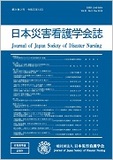Japanese
English
- 有料閲覧
- Abstract 文献概要
- 参考文献 Reference
要約
1.目 的
東日本大震災に関連した福島第一原子力発電所事故により長期の避難生活を送る復興過渡期にある壮年期男性の思いを明らかにする。
2.方 法
修正版グラウンデッド・セオリー・アプローチを用いて研究を行った。2017年9月〜2018年2月に、原発災害により長期の仮設住宅での避難後、復興住宅に転居後1年未満であり、引き続き6年以上の避難生活を送る壮年期男性10名を対象に半構造化面接を行った。
3.結 果
【先の見通しが不確かな中での相反する思い】、【新たな生活で感じる安寧と寂寥といったアンビバレントな思い】、【復興へと歩み出したことでの戸惑い】、【慣れし故郷と思い入れのある我が家への逡巡する思い】、【働く気概を失ったことへの遣る瀬なさ】、【新たな役割や仲間から得られる充実感】の6個のカテゴリが抽出された。
4.結 論
原発災害により長期の避難生活を送る壮年期男性は、おかれた状況やふるさとに対する様々に相反する複雑な思いを抱いていた。
Objective: This study was aimed to clarify the thoughts of late middle-aged men who are evacuating for a long time due to a nuclear disaster during the transition period of disaster recovery.
Method: This study was conducted by the modified grounded theory approach. A semistructured interview was performed during the period from Septe mber 2017 to February 2018 for 10 subjects who continued evacuation life at the disaster restoration public housing that moved after long-term evacuation in temporary housing due to the nucl ear disaster.
Results: We extracted six categories such as “Ambivalent thoughts in a life where the prospects are uncertain,” “Ambivalent thoughts in the new life,” “Puzzled by starting with reconstruction,” “Undecided feeling about familiar home and precious home,” “Sorrow of losing a job title” and “Sense of fulfillment by new role and peers.”
Conclusion: The late middle-aged men who had evacuated for an extremely long period due to the nuclear disaster were living with various conflicting complex thoughts.
Copyright © 2019, Japan Society of Disaster Nursing All rights reserved.


